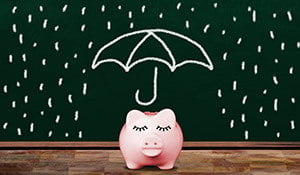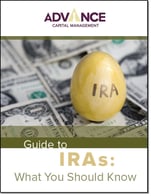Saving for a Rainy Day: Where to Keep an Emergency Fund
November 9th, 2022 | 4 min. read

Unexpected events in life often come with a hefty price tag. In fact, the average emergency expense was about $1,400, according to one study. Which highlights the importance of having an emergency fund.
Unfortunately, a Bankrate survey found that more than half of Americans wouldn’t be able to cover an unexpected $1,000 bill. That doesn’t mean people aren’t aware of the need for emergency savings. A survey by the AARP Public Policy Institute shows 71% of workers say they would contribute to an emergency fund if their employer offered one.
This raises a common question: where to keep it? Most employers don’t offer a special account reserved only for emergency expenses like, say, a health savings account for medical expenses. A fully funded emergency fund is a substantial amount of cash. So, it should be accessible when needed, but not too accessible that it allows people to impulsively spend it.
That means you should be mindful of where you keep an emergency fund. Let’s go over some options and the pros and cons of each.
What’s an emergency fund? The basics
To figure out where to put your emergency fund, it helps to understand the basics. So, let’s first go over what exactly an emergency fund is for and how much you should save.
Basically, an emergency fund is cash set aside for unpredictable financial needs. For example, a major home repair or unexpected medical bill. Perhaps, the biggest unexpected expense is a job loss. An emergency fund can help you stay above water until you find a new one.
How much should you save in an emergency fund?
A good rule of thumb is to save at least one month’s worth of expenses, but most people will need three to six months. As a simple example: if your monthly expenses total $5,000, then an emergency fund of $30,000 would probably be the right amount.
However, the optimal amount you should have in your emergency fund depends on a number of personal details such as your career and income:
- If you and your spouse have solid careers at strong companies within stable industries, your need is likely small.
- If you’re the sole breadwinner, working in a shifting field at a company with a history of layoffs, you should have a considerable amount saved.
- Retirees who rely on their portfolios for income, which is a limited source that can be unstable at times, should also build a sizable fund. It can help for emergencies as well as support their daily needs if markets suffer a substantial downturn, giving their portfolios time to recover.
Where to keep an emergency fund
There are a variety of places where you can keep an emergency fund. They each have advantages and disadvantages. The most important thing is to never keep it in an account that puts that money at risk, such as an investment account or hidden away somewhere in your house (people still do this!).
Checking account
The advantage of a checking account is that it is generally the most accessible. You’ll likely have a debit card that allows you to use that money quickly and easily, such as to pay for a tow truck driver to transport your car after an accident.
But that’s not necessarily a good thing. You may be tempted to use those funds for non-emergency expenses. That’s why it’s better to keep an emergency fund separate from your regular cash accounts.
Savings account
For most people, a savings account or money market account is likely the ideal spot to save an emergency fund.
In a savings account, your emergency fund is accessible but separated from your spending money. This helps you avoid temptation. You can even open a savings account just for this purpose. And, your employer may also allow you to automatically deduct a certain amount from each paycheck to be deposited into this account. Plus, with a savings account you can earn some interest on your money.
A potential downside is that at some banks, there may be a waiting period to transfer, which could be inconvenient if you need the money immediately. But these days, many banks have made it easy to transfer funds from a savings account to a checking account, so you can access that money relatively quickly, when needed.
Money market account
Money market accounts are very similar to savings accounts, but they offer some features of a checking account.
You often receive checks and/or a debit card, which makes it very accessible like a checking account. But you are typically limited to six withdrawals per statement period, similar to a savings account. While that may seem like a disadvantage, it’s a good built-in guardrail against tapping your funds.
Additionally, money market accounts provide competitive interest rates.
A drawback of money market accounts, especially for those just starting to build an emergency fund, is that they may require a larger deposit than traditional savings accounts either to open the account or receive a higher rate.
Certificate of deposit (CD)
The major advantage of a certificate of deposit (CD) is the potential to earn higher interest rates.
That higher yield comes with a catch because they are less accessible, or liquid, than a traditional savings account. CDs typically don’t let you withdraw the money until the end of their term. If you take the money out early, you may be subject to penalty fees or lost interest. This can keep people from touching their emergency funds, but it could also cause problems when the money is needed.
A potential workaround strategy is to “ladder” CDs. Every three months, you buy a 12-month CD until you have four CDs, one of which matures each quarter. Set each one to automatically renew. Then, when you need cash, liquidate the one that was most recently renewed so you won’t miss out on much interest.
Again, most people will find a traditional savings account or money market account as the appropriate place to keep an emergency fund. Yet, everyone’s financial situation is different. You can work with a financial adviser to determine if your cash amount is reasonable for your needs and in the right spot.
One thing we know for certain is that emergencies happen when least expected and they come with a price. That’s why it’s better to hope for the best but prepare for the worst.
If you're wondering where to keep an emergency fund, what about your retirement savings? Download our guide on IRAs to learn about one of the most effective ways to save for retirement.
Advance Capital Management is a fee-only RIA serving clients across the country. The Advance Capital Team includes financial advisers, investment managers, client service professionals and more -- all dedicated to helping people pursue their financial goals.


